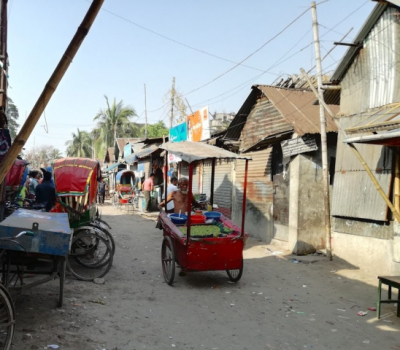A fresh perspective on informal settlements

The PhD thesis of CERN member Dr Wali Uz Zaman, which uses the lens of commoning to offer fresh insights into life in informal settlements in the global South, is now available online.
The thesis entitled, 'A Commons Perspective on Urban Informal Settlements: A Study of Kalyanpur slum in Dhaka, Bangladesh', pushes aside the idea that slums are places of disorder and dysfunction and shows how slum dwellers are contributing their time, effort and creativity to protect their families’ livelihoods and maintain the liveability of slums through collective initiatives.
In the case of the Kalyanpur slum, these include forming small cooperatives that help to secure financial security, establishing a community-based waste collection system (to which households pay a small monthly fee which is used to employ five slum dwellers to run the system), and voluntarily managing and maintaining the shared toilets and tube wells.
One tool that Dr Zaman uses to develop this understanding of life in informal settlements is the commons identi-kit from Take Back the Economy which provides a means to analyse commons through the themes of use, access, benefit, care and responsibility.
Dr Zaman says, “Slum dwellers are creating an urban commons out of the shared urge to earn a living and secure a place to live, and in that process they collaborate, help, care, negotiate, avoid, and sometimes are in conflict with others.”
Dr Zaman’s analysis opens up avenues for policies that are better matched to the reality of life in informal urban settlements.
He says, “Current approaches emphasise the poor living conditions of slum dwellers and this means that planning and policy interventions focus on improving housing and shelter, as if slums emerge only to serve the residential needs of those who live there.”
“But the housing and shelter-based understanding of slums is not adequate to capture the dynamism of these unique settlements. Slum dwellers are actively, carefully and strategically creating and improving their environments—they are urban commoners.”
“What limits the ability of these commoners to improve their living conditions is not the lack of material resources but an enabling environment which supports the full range of their commoning practices.”
Dr Zaman also brought a GIS perspective to commons by investigating the spaces where commoning activities are concentrated and how these spaces are carefully crafted by the commoners. By doing this Dr Zaman has highlighted the place-making process in the informal settlements and agency of the people in shaping and making their place.
Prior to undertaking his PhD, Dr Zaman worked as a Programme Officer for ActionAid in Bangladesh; he says, “When I started my PhD I was desperately searching for a fresh perspective to help inform discussions and interventions related to informal settlements, and I found this through the commons lens that I applied in the thesis.”
Dr Zaman undertook his PhD through the Department of Geography at the University of Canterbury in Christchurch, Aotearoa New Zealand, and was supervised by Associate Professor Kelly Dombroski. He is now based in Auckland Aotearoa New Zealand working as Graduate Spatial Consultant with GHD and an independent scholar.
Photo by Wali Uz Zaman
Jenny Cameron
